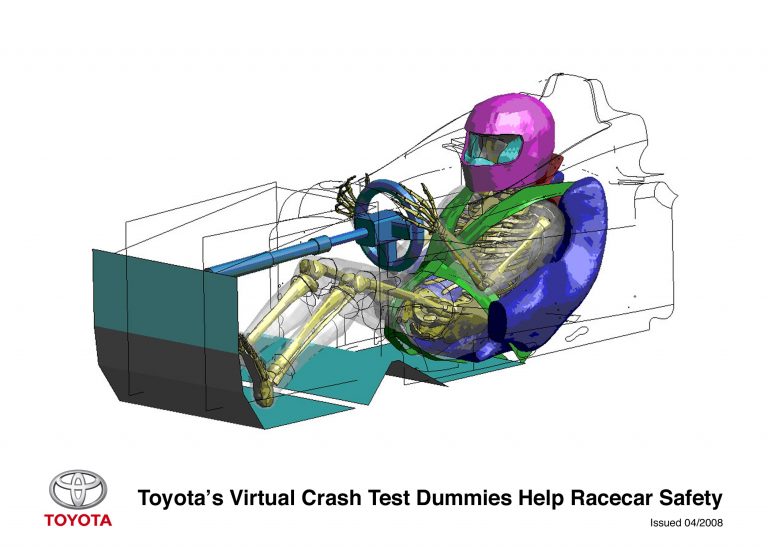Toyota’s Virtual Crash Test Dummies Help Racecar Safety
The FIA Institute and Toyota have combined technology and expertise to help improve safety in high speed racecar accidents.
Toyota has been using a computer simulation system, called Total Human Model Safety (THUMS), to help it design safer production vehicles for several years. THUMS is a virtual representation of the human body that can provide Toyota engineers with precise data about the injuries real people might suffer in different kinds of vehicle accidents.
The FIA Institute and Toyota have worked together to use the THUMS system to recreate high speed accidents and their effects on human physiology, allowing them to study the kind of serious injuries that are difficult to measure with conventional crash test dummies. The results of the new study are in the process of completion.
The FIA Institute targeted this technology specifically to help study high speed rear impact crashes in the FIA Formula One World Championship and Indy Racing League (IRL). THUMS has proved very effective for analysis of the complex interaction between the driver’s body and the car in a high speed accident.
The FIA Institute and Dr Terry Trammell, a fellow of the FIA Institute and consultant to IRL, have provided data on accidents of this type and information on racecar seat structures. These have been used by Toyota to create virtual collisions using THUMS and simulated racecar seat designs, which have succeeded in replicating spinal injuries from high speed rear impact collisions.
This co-operative effort has led to a determination of the mechanism for spinal-stress build-up – the result of a combination of G-forces and the specific seating position used in F1 and IRL racecars. The research has prompted consideration of what measures might be taken to reduce stress on the spine during rear impact collisions.
The FIA Institute expects the research to lead to improved safety for F1, IRL and other single-seater racecar championships.
ENDS
About the FIA Institute
The FIA Institute was established in October 2004 by the FIA and the FIA Foundation. It receives an annual grant from the FIA Foundation to fund research projects and other safety-led activities. The aims of the FIA Institute are to encourage the rapid development of new and improved safety technologies, to facilitate ever higher standards of education and training and to campaign to raise awareness of safety issues amongst all of those involved in motor sport.


